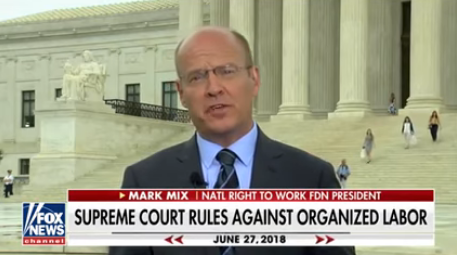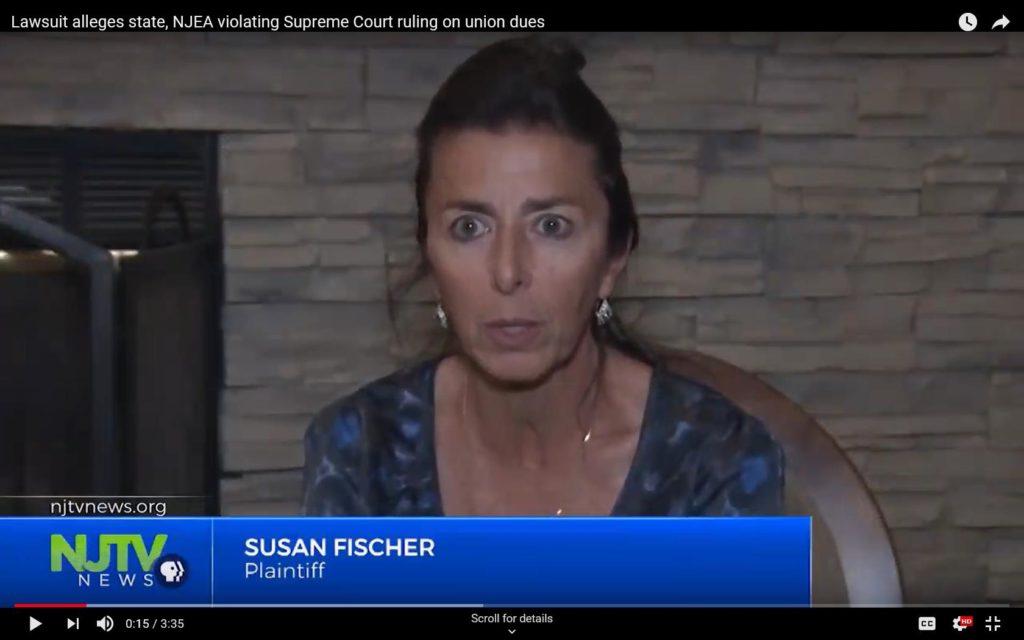Is This Any Way to Run a City’s Schools?
Leaked CTU Proposals Won’t Do Anything to Improve Schools’ Poor Performance
Union Dons Defiantly Cling to Coercive Power

Attempt to Undermine High Court Decision by Deceiving Workers
Last June, the U.S. Supreme Court decided that government employers across the country may not deduct union dues or fees from employees’ paychecks unless the employees “clearly and affirmatively consent before any money is taken from them . . . .”
So declared Justice Samuel Alito in his court opinion in Janus v. American Federation of State, County and Municipal Employees Council 31, a case argued and won on behalf of independent-minded Illinois civil servant Mark Janus by National Right to Work Legal Defense Foundation attorney Bill Messenger.
Union Bosses Face Potential Loss of Billions of Dollars
Governments that siphon money out of employee paychecks and funnel it to union bosses without the employee’s clear and affirmative consent violate the First Amendment, affirmed the Janus court.
At the time the Janus ruling came down, the labor laws of 24 states either explicitly authorized or tolerated the extraction of forced union dues and fees from employees as a condition of working for the taxpayer.
Now, thanks to this decision, government union bosses face the potential annual loss of hundreds of millions or even billions of dollars in coerced union dues and fees.
Government Union Chiefs Keep Seizing Dues From Employees Who Have Resigned
Unfortunately, roughly seven months after the Janus decision was announced, government union chiefs in state after state are defying the Supreme Court and continuing to seize forced dues from public employees after they’ve resigned from the union.
“It now appears that comprehensive implementation of Janus may require state legislation that abolishes union monopoly bargaining in the government sector,” said National Right to Work Committee and Foundation President Mark Mix.
“Without so-called ‘exclusive representation’ power, Big Labor won’t be able to continue getting union dues deducted from any employee’s paycheck without having his or her affirmative, ongoing consent.”
Of course, most incumbent politicians in Big Labor stronghold states like New Jersey are not the least bit interested in ensuring that public servants are able to exercise their constitutional rights under Janus.

‘Pay If You Join, Pay If You Don’t Join’
Indeed, last May, in a preemptive bid to blunt the impact of Janus, Garden State politicians enacted a law that is plainly designed to make it as difficult as possible for government workers who are currently union members, but no longer wish to be, to quit and cease financially supporting Big Labor.
The freedom of speech of New Jersey educators like Susan Garra Fischer and Jeanette Speck has been trampled by union-label legislators’ cynically mislabeled “Workplace Democracy Enhancement Act.”
Ms. Fischer and Ms. Speck are both employed as public school teachers in Monmouth County, N.J.
Neither of them ever wanted to join or bankroll the highly political New Jersey Education Association (NJEA) union, which is a subsidiary of the mammoth National Education Association (NEA) union.
But both became NJEA members at the time they were hired, because, even if they hadn’t, they would have been forced to pay fees that were nearly as high as full union dues anyway.
In a recent interview with Laura Walters of NJ Left Behind, Ms. Fischer commented: “I grew up in Italy. There, we call this ‘extortion.’ Pay if you join, pay if you don’t join. There’s no choice.”
‘When the [Janus Ruling] Came Out . . . We Were Ecstatic! Now We Have a Choice!’
Over the course of her 30 years as an Italian teacher in New Jersey public schools, Ms. Fischer estimates that she has involuntarily ceded $30,000 from her hard-earned salary to national, state and local government union bosses.
What angers her the most is the $800 per year she has been forced to fork over to the NJEA union: “[T]hat’s highway robbery! NJEA does nothing for us, even though they get the biggest chunk out of my paycheck.”
Ms. Fischer and other freedom-loving teachers couldn’t have been more pleased when they found out about the Janus outcome last summer:
“We were ecstatic! Now we have a choice! I read all 82 pages of Janus twice.”
But Ms. Fischer and Ms. Speck (a civics teacher), who both thought their days of being forced to bankroll government unionism were finally over, were soon to be disappointed.
As a consequence of the Janus countermeasure signed by Gov. Phil Murphy last spring, they and other K-12 school staff, as well as other state and local government employees, may only cut off their financial support for a union during a 10-day window out of the entire year.
In September 2018, Ms. Fischer and Ms. Speck were still being forced to pay union dues as a job condition, even though they had submitted their resignations roughly two months earlier.
Last November, with free legal help from Mr. Messenger and other Foundation attorneys, Ms. Fischer and Ms. Speck filed a federal class action complaint against Mr. Murphy and officials of the NJEA and its Ocean Township subsidiary.
Over Time, Right to Work Litigation Will Surely Foster Better Janus Compliance
One of the educators’ goals is to get back the forced union dues that were seized from them after Janus and after they had provided notice to union bosses and school officials that they did not consent to having any more money for the NJEA/NEA empire siphoned out of their paychecks.
Another goal is to permanently enjoin the State of New Jersey from maintaining and enforcing the provisions in the so-called “Workplace Democracy Enhancement Act” that bar civil servants from exercising their right not to pay money to a union they don’t want for 355 or 356 days out of each year.
Mr. Mix commented:
“Thank goodness for Susan Fischer and Jeanette Speck and the other public servants in state after state who are willing to go to court to fight for their own rights and the rights of their fellow employees, and for the dedicated and talented Right to Work attorneys who are assisting them.
“Over the next year or two, litigation like Fischer v. Murphy will surely make elected officials and bureaucrats far more reluctant to abet Janus circumvention by government union bosses.”
Justice Alito: ‘Exclusivity’ Substantially ‘Restricts the Rights of Individual Employees’
“Up to now,” Mr. Mix acknowledged, “Big Labor has undoubtedly been able, with politicians’ and bureaucrats’ connivance, to deceive many government workers who want to exercise their Janus rights into thinking they will have to wait additional months or even years before they can do so.
“As the efforts of Foundation attorneys and employees who treasure their Right to Work expose the hollowness of government union bosses’ claims, more and more unionized civil servants in state after state are bound to take advantage of their now-recognized freedom to refuse to bankroll Big Labor.
“However, public employees who don’t want a union will continue to be pressured to join as long as state laws handing union bosses monopoly power to negotiate their pay, benefits, and work rules remain in place.
“Justice Alito’s Janus opinion acknowledges such ‘exclusivity’ substantially ‘restricts the rights of individual employees,’ but the Janus majority did not do anything about it.
“Fortunately, state lawmakers clearly do have the constitutional authority to ban all union monopoly bargaining in public workplaces.”

Leaked CTU Proposals Won’t Do Anything to Improve Schools’ Poor Performance

Wherever Big Labor wields the power to collect forced union dues, union bosses funnel a large share of the confiscated money into efforts to elect and reelect business-bashing politicians. Employment growth tends to lag as a consequence.

Members Insist They Keep Pro-Right to Work Campaign Promises